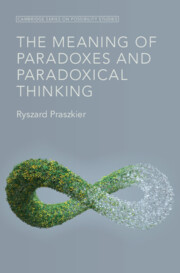Book contents
- The Meaning of Paradoxes and Paradoxical Thinking
- Cambridge series on possibility studies
- The Meaning of Paradoxes and Paradoxical Thinking
- Copyright page
- Contents
- Figures
- Tables
- Acknowledgments
- Introduction
- Part 1 Paradoxes and What They Do to Us
- Part II Sudden Unexpected Changes
- Part III Challenging the Impossible
- Part IV Peace and Its Challenges
- Part V Paradoxes and Creativity
- Part VI Paradoxes in Action
- Introduction
- Chapter 15 Turning the Impossible into the Possible
- Chapter 16 Paradoxes in Psychotherapy
- Chapter 17 Life and Paradoxes
- Discussion and Summary
- Chapter 18 Précis
- References
- Index
Discussion and Summary
from Part VI - Paradoxes in Action
Published online by Cambridge University Press: 04 April 2025
- The Meaning of Paradoxes and Paradoxical Thinking
- Cambridge series on possibility studies
- The Meaning of Paradoxes and Paradoxical Thinking
- Copyright page
- Contents
- Figures
- Tables
- Acknowledgments
- Introduction
- Part 1 Paradoxes and What They Do to Us
- Part II Sudden Unexpected Changes
- Part III Challenging the Impossible
- Part IV Peace and Its Challenges
- Part V Paradoxes and Creativity
- Part VI Paradoxes in Action
- Introduction
- Chapter 15 Turning the Impossible into the Possible
- Chapter 16 Paradoxes in Psychotherapy
- Chapter 17 Life and Paradoxes
- Discussion and Summary
- Chapter 18 Précis
- References
- Index
Summary
Paradoxes are not only quip puns (see examples in the Introduction). They often come from philosophy and are present in the academic literature (see Chapter 1). However, they can also serve as action-drivers. Elaborating on the concept of possibilitivity (i.e., perceiving insurmountable challenges as doable; see Chapter 7), Chapter 15 presented various examples of transcending the impossible in the field of social activities. Chapter 16 provided an overview of applications of paradoxical interventions in psychotherapy. Chapter 17 demonstrated paradoxes in life, including the astounding paradox that chaos may play a positive role in various settings.
- Type
- Chapter
- Information
- Publisher: Cambridge University PressPrint publication year: 2025

